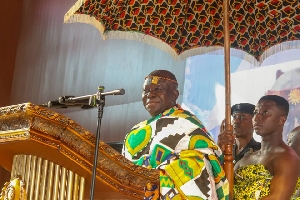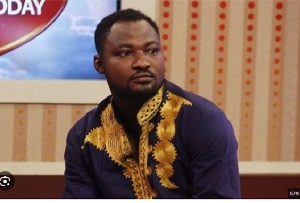Opinions of Thursday, 5 February 2015
Columnist: Okoampa-Ahoofe, Kwame
Asante Confederacy Is 300 Years Old, Not 80 Years Old, GJA!
By Kwame Okoampa-Ahoofe, Jr., Ph.D.
Garden City, New York
Feb. 1, 2015
E-mail: okoampaahoofe@optimum.net
No, it is not about what you are thinking. I am not so much interested in the discretionary decision by some members of the Ghana Journalists' Association (GJA) to boycott official functions and activities hosted by Manhyia, the official palatial residence of the Asantehene, His Majesty Otumfuo Osei-Tutu II. I am more concerned here with the persistently erroneous impression being widely disseminated by local media operatives, including the Asante Regional Branch of the GJA, that the Asante Confederacy is 80 years old (See "We've Not Sanctioned Manhyia Boycott - Ashanti GJA" Citifmonline.com / Ghanaweb.com 2/1/15).
The Asante Confederacy, created by King Osei-Tutu I and his bosom friend and Chief Priest Anokye-Birempong, dates from the late 1600s; and so what very likely these journalists are alluding to is the landmark decision of the erstwhile British colonial administration to restore the hitherto proscribed Asante Confederacy in 1935, following the inglorious and infamous arrest of Otumfuo Agyeman-Prempeh I in 1896, and his summary deportation, first, to Sierra Leone and subsequently to the Indian Ocean island of The Seychelles for some twenty years.
What is obvious here is that the entire membership of the Ghana Journalists' Association requires advanced tutorials in not only a comprehensive history of Ghana's single most significant Akan sub-ethnic polity but, in fact, a comprehensive course of study on the precolonial history of Modern Ghana. It is very embarrassing for me to admit that more than a half-century after Ghana reasserted its sovereignty from British colonial and imperial domination, Ghanaians still have to consult the works of European Africanist scholars in order to fully appreciate our sociopolitical and cultural identities.
One authoritative tome that would have assisted the likes of Mr. Listowel Yesu Bukarson (I hope I have his last name spelt correctly), GJA's Asante Regional Chairman, in avoiding such inexcusable faux-pas as to scandalously claim the Asante Confederacy to be only 80 years old, is Mr. W. E. F. Ward's The History of Ghana. If memory serves yours truly accurately, Mr. Ward was the first principal of what is presently the country's flagship academy, The University of Ghana, Legon.
With blisteringly ignorant journalists like those who are reported to have individually decided to boycott any coverage of activities hosted and/or sponsored by Manhyia, the recently media-embattled Otumfuo Osei-Tutu II can only sigh with relief. Lest my views get grossly misrepresented on this subject, as one Asantehene biographer had occasion to do recently, I am not in any way endorsing the alleged maltreatment of/or hostility meted some GJA members and other media operatives who had gone to the Manhyia Palace to cover activities to which the press had, allegedly, been invited beforehand.
That is an issue that I take with utmost seriousness, being that I am, myself, a professionally trained journalist and an award-winning one. I sincerely don't know the order of things at Manhyia, as far as the handling of the media is concerned, but one would like to think or believe that Manhyia has a special office devoted to the press and the media at large, where major media establishments like the Ghana News Agency, Ghana Broadcasting Corporation (GBC), both radio and television divisions, as well as cutting-edge media operatives like Joy-Fm/Multimedia TV and Peace-Fm, among a legion others, are premanently represented by their correspondents.
According to Mr. Yesu Bukarson, the Asante Regional Chairman of the Ghana Journalists' Association, no official decision and/or position has been taken by way of an official response to the allegedly persistent hostilities routinely meted its members who have been dispatched to Manhyia to cover official programs and activities. Well, the sooner some acceptable middle ground got forged between the Asantehene's Palace and the media at large, the better the greater public interest stands to be healthily served.
For now, however, my main and particular concern is for most of our young and active media practitioners to take graduate courses in the political history of the country. We cannot expect any remarkably high quality in the content of media out locally generated by Ghanaian journalists, with such an unacceptably high level of cultural illiteracy. Less "Soli" and more burning of the post-dumsor midnight oil.
__________________________________________________________












